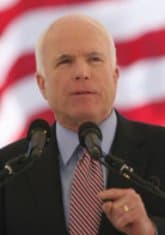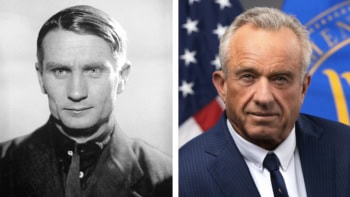
US presidential candidate John McCain has joined the debate on the future of American science by answering the “14 top science questions facing America” posed by the organization ScienceDebate 2008.
The Democratic party hopeful Barack Obama has already answered the same questions, which were selected from thousands of suggestions sent in by the American public.
Some scientists have accused the current Republican administration of political interference when it comes to climate change and other politically-charged scientific issues. But in response to how he would “balance scientific information with politics and personal beliefs?” McCain — also a Republican — says “Denial of the facts will not solve any of these problems… I believe policy should be based upon sound science”.
Denial of the facts will not solve any of these problems…I believe policy should be based upon sound science John McCain
To do this, McCain promises to recruit at least five science and engineering experts into senior advisory positions with the aim of “restoring the credibility and role of the Office of Science and Technology Policy as an office within the White House.”
McCain says he is “committed to reinvigorating America’s commitment to basic research, and will ensure my administration funds research activities accordingly”. He points out that he has a record of supporting increased funding for science research, adding “I have a broad and cohesive vision for the future of American innovation.” He also says he would encourage the commercialization of new technologies — particularly those created by federally funded research.
To the moon and beyond
Looking to the heavens, McCain says he would “Ensure that space exploration is top priority and that the US remains a leader.” He has committed himself to funding NASA’s Constellation programme, which aims to send astronauts to the Moon by 2020. McCain also promises to complete construction of the ISS National Laboratory — which is the US-funded portion of the International Space Station – and “seek to maximize [its] research capability and commercialization possibilities.
On the subject of climate change, McCain says: “The facts of global warming demand our urgent attention, especially in Washington.” He says he will establish a tax credit equal to 10% of a firm’s wages spent on research and development to encourage the development of environmentally friendly technologies. He also wants to offer a $300m prize for the development of a battery package that would improve significantly performance of electric and hybrid vehicles.
Turning to energy security and sustainability, McCain says he will ensure that 45 new nuclear reactors are built in the US by 2030. However, he supports “letting the market decide” which alternative forms of energy (such as wind and solar) would be ultimately be adopted by the US.
Cash for science teachers
On education, the Republican candidate says he will “Grow public understanding and popularity of mathematics and science by reforming mathematics and science education in schools.” He stresses the importance of ensuring that US primary and secondary schools prepare students for “the rigors of engineering, math, science and technology degrees”. To achieve this, McCain will devote 60% of “Title II” federal education funding to produce pay bonuses for “high performing teachers” in math, science and other key subject areas.
ScienceDebate 2008 was formed towards the end of last year by a group of six people who wanted science policy to be debated by the presidential candidates in the run up to the November election. Since then the organizers have gathered the signatures of some 37,000 supporters including university presidents, the representatives of scientific institutions and Nobel laureates.
While Matthew Chapman, president of Science Debate 2008, is grateful that McCain and Obama have both responded, he remains hopeful that the candidates will also agree to attend a televised debate on science policy, which was the original motive of the organization.
• You can read John MacCain’s’s full responses to the questions posed by ScienceDebate 2008 here.



